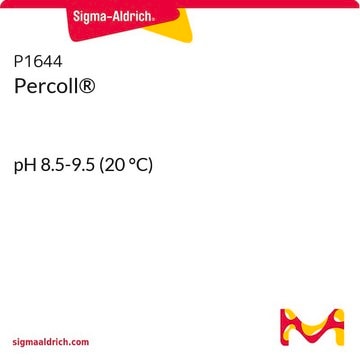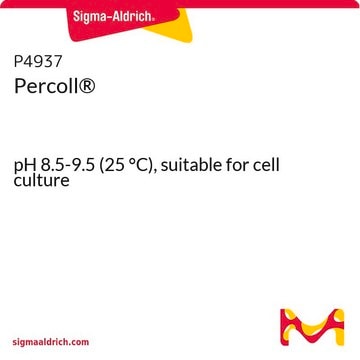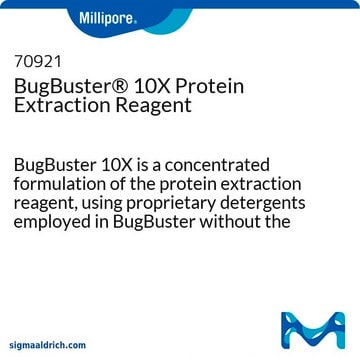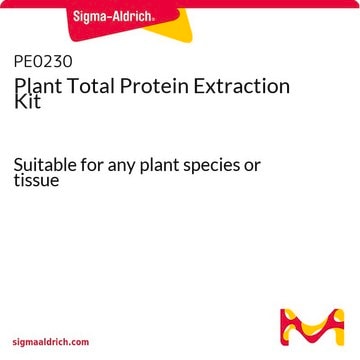CPISO
Chloroplast Isolation Kit
isolation of intact chloroplasts from leaves
Synonym(s):
Chloroplast Purification Kit, Isolation Kit for Chloroplast, Kit for Chloroplast Isolation
Sign Into View Organizational & Contract Pricing
All Photos(1)
About This Item
UNSPSC Code:
12352200
NACRES:
NA.32
Recommended Products
General description
The Chloroplast Isolation Kit provides an efficient procedure for isolating intact chloroplasts from plant leaves. The procedure involves mechanical cell wall and cell membrane breakage, removal of cell debris and leaf tissue by filtration, collection of total cell chloroplast fraction by centrifugation, and separation of intact chloroplasts from broken chloroplasts using a Percoll® layer or gradient.
Application
Chloroplast Isolation Kit may be used in chloroplast organelle research to isolate intact chloroplasts from plant leaves for structural and functional studies.
Features and Benefits
- Specifically formulated buffer - Saves time using easy to follow simple and proven protocols
- Isolates intact chloroplasts - Useful for studies of such processes as carbon assimilation, electron flow and phosphorylation, metabolic transport or protein targeting
- Total organelle protein complement - Useful for functional studies, metabolic transport, proteomic profiling, and genomic applications
- Convenient format - Saves time and reduces waste
Suitability
The Chloroplast Isolation Kit has been tested for use with spinach, pea, lettuce, cabbage, mangold, and tobacco.
Storage Class Code
10 - Combustible liquids
Certificates of Analysis (COA)
Search for Certificates of Analysis (COA) by entering the products Lot/Batch Number. Lot and Batch Numbers can be found on a product’s label following the words ‘Lot’ or ‘Batch’.
Already Own This Product?
Find documentation for the products that you have recently purchased in the Document Library.
Customers Also Viewed
Juan Manuel Pérez-Ruiz et al.
The Plant cell, 18(9), 2356-2368 (2006-08-08)
One of the mechanisms plants have developed for chloroplast protection against oxidative damage involves a 2-Cys peroxiredoxin, which has been proposed to be reduced by ferredoxin and plastid thioredoxins, Trx x and CDSP32, the FTR/Trx pathway. We show that rice
Yayi Tu et al.
PloS one, 10(8), e0136210-e0136210 (2015-08-27)
Potato virus Y (PVY) is an important plant virus and causes great losses every year. Viral infection often leads to abnormal chloroplasts. The first step of chloroplast division is the formation of FtsZ ring (Z-ring), and the placement of Z-ring
Yuexia Wang et al.
BMC plant biology, 20(1), 96-96 (2020-03-07)
The perturbance of chloroplast proteins is a major cause of photosynthesis inhibition under drought stress. The exogenous application of 5-aminolevulinic acid (ALA) mitigates the damage caused by drought stress, protecting plant growth and development, but the regulatory mechanism behind this
The Complete Chloroplast Genome of 17 Individuals of Pest Species <I>Jacobaea vulgaris</I>: SNPs, Microsatellites and Barcoding Markers for Population and Phylogenetic Studies.
Doorduin, L., et al.
DNA Res., 1-13 (2011)
Xiaoli Luo et al.
PloS one, 8(1), e54002-e54002 (2013-01-22)
In plants, CuZn superoxide dismutase (CuZnSOD, EC l.15.1.1), ascorbate peroxidase (APX, EC 1.11.1.11), and catalase (CAT, EC l.11.1.6) are important scavengers of reactive oxygen species (ROS) to protect the cell from damage. In the present study, we isolated three homologous
Our team of scientists has experience in all areas of research including Life Science, Material Science, Chemical Synthesis, Chromatography, Analytical and many others.
Contact Technical Service










